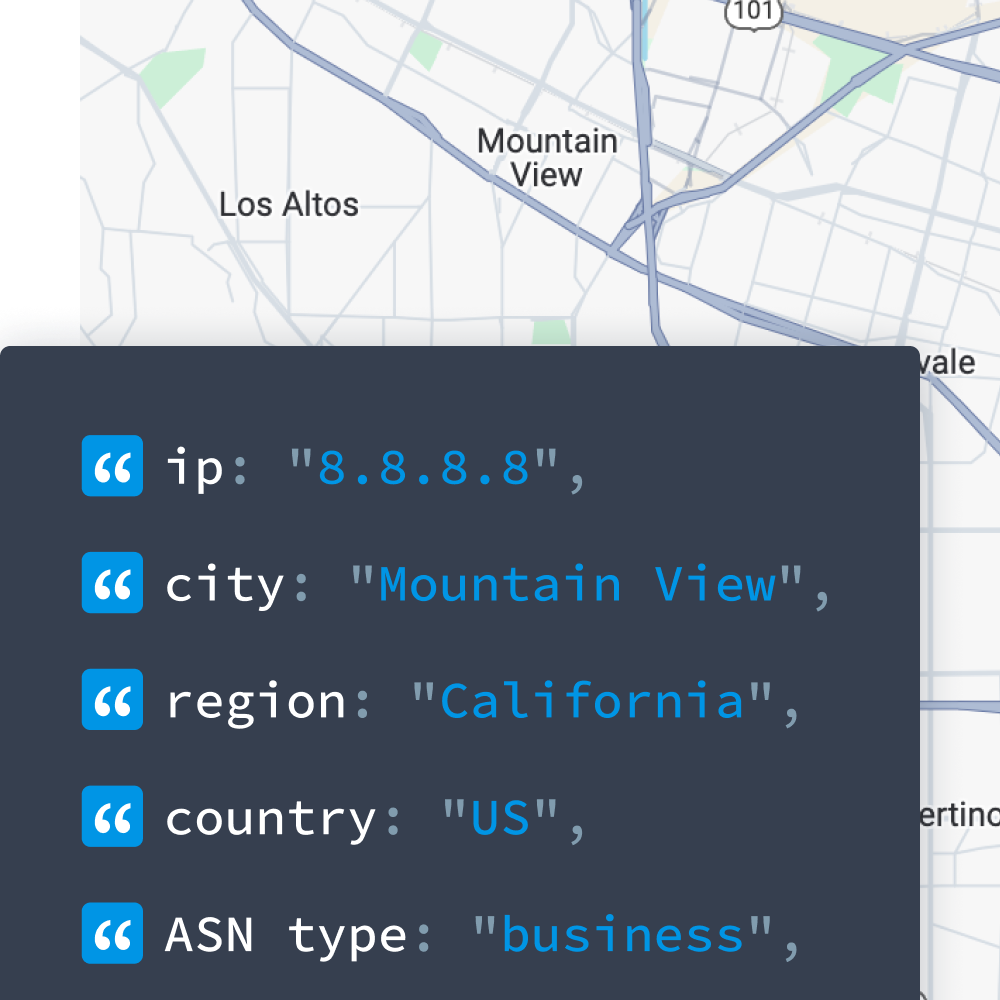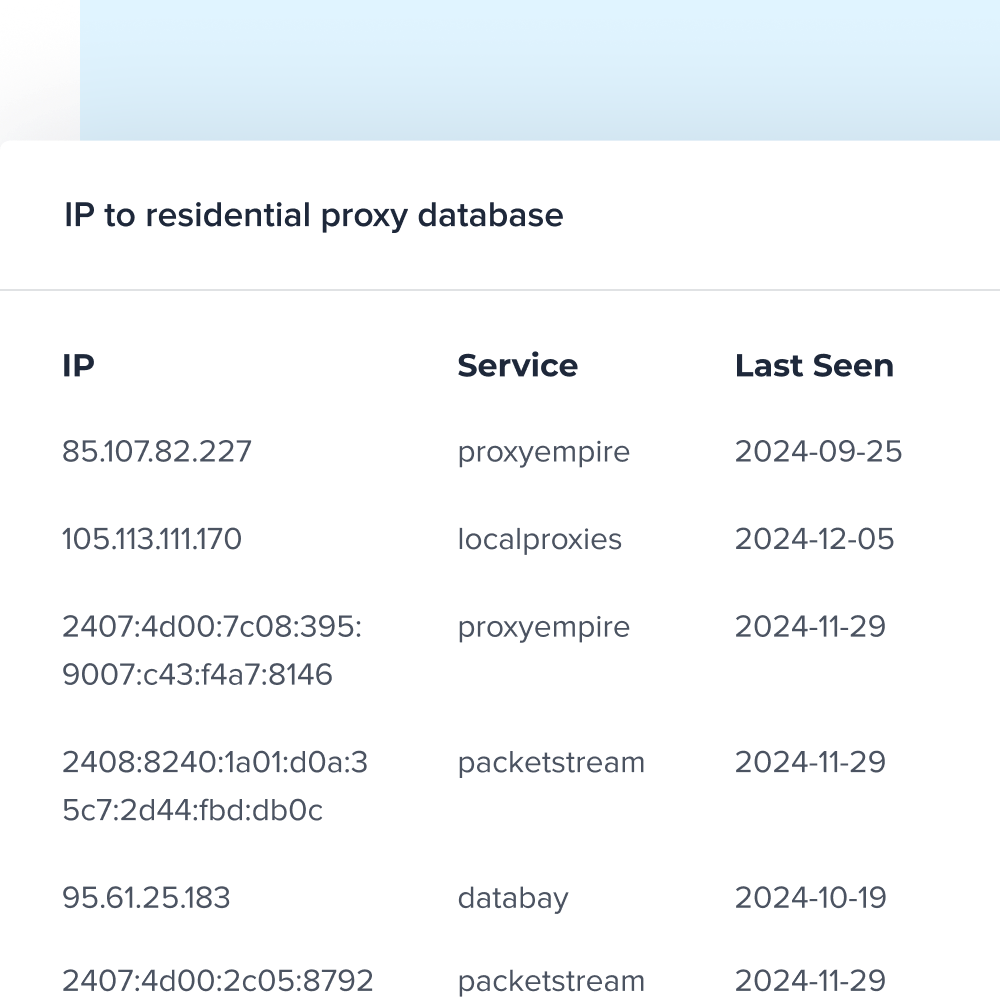 My IP ↗or
My IP ↗orIP address data can transform how companies operate, from evaluating security risks to ensuring regulatory compliance to driving better customer experiences. By analyzing IP geolocation, businesses can gain deeper insights into user behavior, optimize targeted marketing strategies, enhance fraud prevention, and create more personalized interactions.
Read on to learn more about what IP data is available and how it can enable better business decisions.
What Is an IP Address?
An IP address is a network address that is used to send and receive data over the internet. IP stands for “internet protocol,” referring to a set of protocols that govern the transmission of data packets across the web. These protocols are similar to the standardized way people write out physical addresses on envelopes, ensuring their mail reaches the intended destination. An IP address, therefore, serves as a specific endpoint for data transfer, much like receiving mail at your home address.
An IP address can be in either IPv4 or IPv6 format and consists of numeric (and sometimes alphanumeric) values separated by decimal points. Each device connected to the internet, from smart cars to personal laptops, has a unique IP address. IP address accuracy depends on several factors, including the type of IP address. The main types of IP addresses are:
- Private IP addresses: Used within internal networks to connect devices securely without exposing them to the public internet.
- Public IP addresses: Assigned by ISPs, allowing devices to connect to the internet directly.
- Dynamic IP addresses: Automatically assigned by an ISP, often changing each time a device reconnects.
- Static IP addresses: Permanently assigned IPs, often used by businesses needing consistent connections.
- Residential IP addresses: Assigned to home users.
What Information Can You Get from an IP Address?
Using an IP data provider like IPinfo, an IP address can provide information like the general location (like city, region, or country) of the device or network accessing the internet, as well as the internet service provider and ASN information. IP address data can also identify if a user is employing services such as a VPN or proxy server.
Location
An IP address shows a user’s general location, often down to the country, state, or city level, but, importantly, precise street-level location coordinates are not available, ensuring user privacy. Geolocation accuracy for IP addresses depends on the internet service provider (ISP), the type of IP address assigned, how a user is accessing the internet (if they’re using a VPN or shared network), whether the IP is for a mobile device, as well as other factors. This level of detail ensures that companies can monitor suspicious activity from selected regions and provide users with valuable personalized content tailored for their area without compromising their privacy.
Discover location-based data instantly with IPinfo’s IP address geolocation API
Get access to the quickest and most reliable solution for accessing geolocation context.
Internet Service Provider (ISP)
IP address information includes the device’s Internet Service Provider (ISP). In addition to the name and domain of the ISP, users can find the abuse contact information for that ISP in the event that they need to report an incident.
Network Information
IPinfo derives additional network information from IP addresses, along with the ISP, including:
- The Autonomous System Number (ASN), which represents blocks of IP addresses that are owned by a large organization
- The ASN type, which can be an ISP, a business, hosting provider, or educational institution
- The hostname, which is the domain name assigned to the host computer
- The number of hosted domains on the IP address
- Privacy detection, like whether the IP address is coming from a VPN or proxy
Combined, this information paints a picture of the user behind the IP address.
What Do Companies Do With Data from Your IP Addresses
There are misconceptions about IP addresses storing information that includes internet usage history and users’ personal information, but that’s not the case. The information available via IP addresses is a game-changer for companies – and their users – in a myriad of beneficial ways. Company IP data, for example, helps businesses determine what industries to target with outreach.
Localized Content
IP address information enables companies to deliver localized content that enhances user experience. By gaining a general sense of users’ geographic locations, companies can pre-populate location on signup forms, share relevant product offerings, location-based offers and advertisements, and events tailored to local interests. This targeted approach makes it easier for users to find useful information, like nearby recommendations and accurate shipping estimates, fostering trust and engagement. Personalized content based on location helps streamline the user experience by delivering relevant details, like product cost in local currency, guiding purchasing decisions, and providing visitors with a more intuitive and valuable website experience.
Targeted Advertising
Companies use IP address data to craft targeted advertisements that resonate with specific audiences. By identifying particular traits of their users, they tailor ads for specific interests, promotions, and products. For example, a company can advertise winter gear in one hemisphere while promoting summer items in the other, ensuring ad content aligns with what customers are experiencing in their daily lives. For another example, a company doing an ABM campaign can advertise services to employees at a particular company based on the company reflected in their IP address. This hyper-tailored strategy not only improves ad effectiveness, but also helps reduce wasted ad spend.
Language and Currency Adjustments
Global companies might opt to have their websites automatically detect users’ geolocations, then default to the correct language or currency based on that information. A user in the United States can visit a company’s website and instantly be able to read product and service descriptions, as well as know how much a product or service will cost in US dollars.
Conversely, when users visit a website where they’re expecting an automatic language translation or currency conversion and don’t get one, their barrier to entry is immediately higher, resulting in a more challenging user experience and less likelihood of conversion.
Suspicious Activity Monitoring
Monitoring suspicious activity using IP address data is essential for companies facing modern-day cybersecurity threats, maintaining companies’ reputations, guarding sensitive information, and protecting financial security.
By tracking IP address data, like login patterns and geographic locations, companies can detect anomalies that might indicate unauthorized access or malicious traffic, such as logins from unfamiliar or high-risk IP addresses. By leveraging this information, companies can maintain more well-informed vigilance, ensuring that they can develop better fraud risk models and that any suspicious behavior is promptly detected and assessed to safeguard important data, infrastructure, and user accounts.
Geoblocking
IP location data plays a vital role for companies using geoblocking to adhere to licensing agreements, content restrictions, and data privacy protections. Geolocation helps businesses to restrict content in regions with specific censorship or broadcasting and content licensing laws, limit access to financial services where regional regulations apply, prevent gambling in restricted locations, and apply accurate sales tax based on user location. With effective geoblocking, companies can more easily navigate the multitude of global differences in rules and regulations while providing positive user experiences.
Detect residential proxies with accurate IP data
Add a critical layer of defense to your fraud prevention and security workflows by identifying residential proxy IPs.
User Traffic Analysis
Companies use IP data to gain insights into where their website users are coming from, allowing them to analyze traffic trends and identify the regions driving the most visits. By assessing data like geolocation and mobile carrier information, companies can track spikes in traffic and attribute them to specific events or campaigns. For instance, a sudden increase in visitors from a particular city may indicate the impact of a local marketing effort, like a radio ad or community event. This geographic insight helps companies refine their marketing strategies, focusing efforts on high-engagement areas and tailoring content to local audiences.
Website Performance Improvements with CDNs
Armed with IP geolocation information, companies can strategically optimize server locations or configure content delivery networks (CDNs) to enhance their website performance. This load balancing approach distributes traffic to servers closest to the user, significantly reducing load times and ensuring smoother browsing experiences. Delivering from nearby servers minimizes latency, resulting in faster page loads and less buffering. Optimizing server resources based on user location not only improves user satisfaction, but also boosts engagement, as faster sites tend to have lower bounce rates and higher retention. This geographical optimization supports a superior online experience.
Research Consumer Behavior
Marketing agencies can use aggregated IP address data to study consumer behavior in particular places, providing valuable insights into which products, services, or content types appeal most in specific areas and enabling companies to shape their marketing strategies accordingly. For example, an agency might find a strong demand for a particular shoe brand in Columbus, Ohio, leading them to focus more of their efforts in that area with relevant promotions and tailored messaging that foster stronger connections with local consumers.
Perform Demographic Profiling
IP data provides demographic information like city, country, and region, which companies can use as part of a larger effort to build detailed demographic profiles and inform potential market segments based on regional characteristics. By enriching their other data sources with this information, companies can gain highly sophisticated insights about local interests and trends within specific areas. With these profiles, organizations can tailor products, services, and marketing campaigns to meet the needs of diverse segments, making their outreach more relevant and effective.
Ensure Regulatory Compliance
IP location data enables companies to adhere to regulatory compliance, like the General Data Protection Regulation (GDPR) within a European Union law or other data localization requirements in certain states, regions, or countries. GDPR, for example, mandates that companies only collect personal information with the consent of the information owner. Companies can prompt users in relevant geographic areas to determine if and how they want their data collected using geolocation data.
Get Easy Access to IP Information With IPinfo
IPinfo offers the world’s most accurate and detailed IP data, making it the industry standard for IP data excellence. Our data is continuously updated daily to ensure accuracy, and it’s available in several formats, including an easy-to-use API, a simple downloadable database, or seamless integrations with leading cloud platforms, providing our users with flexibility and ease of use tailored to their specific business needs.
Since 2013, we’ve empowered millions of users, enabling them to enhance and optimize digital experiences across a diverse array of industries. Our IP geolocation API, informed by our innovative global Probe Network, grants us unprecedented reach and real-time data, while our privacy detection API identifies various means of concealing IP addresses. Our team and larger community are available 24/7 to provide support and share use cases. Companies use our data to make more informed decisions, protect their brand reputations, engage in more effective marketing strategies, and drive better outcomes in their digital initiatives.
Get instant access to the data you need
Look up accurate information about any IPv4 and IPv6 address to be provided with accurate information. Sign up for IPinfo.
About the author

Meghan is the content strategist at IPinfo, where she develops and writes content for users to better understand the value of IP data and IPinfo products.


